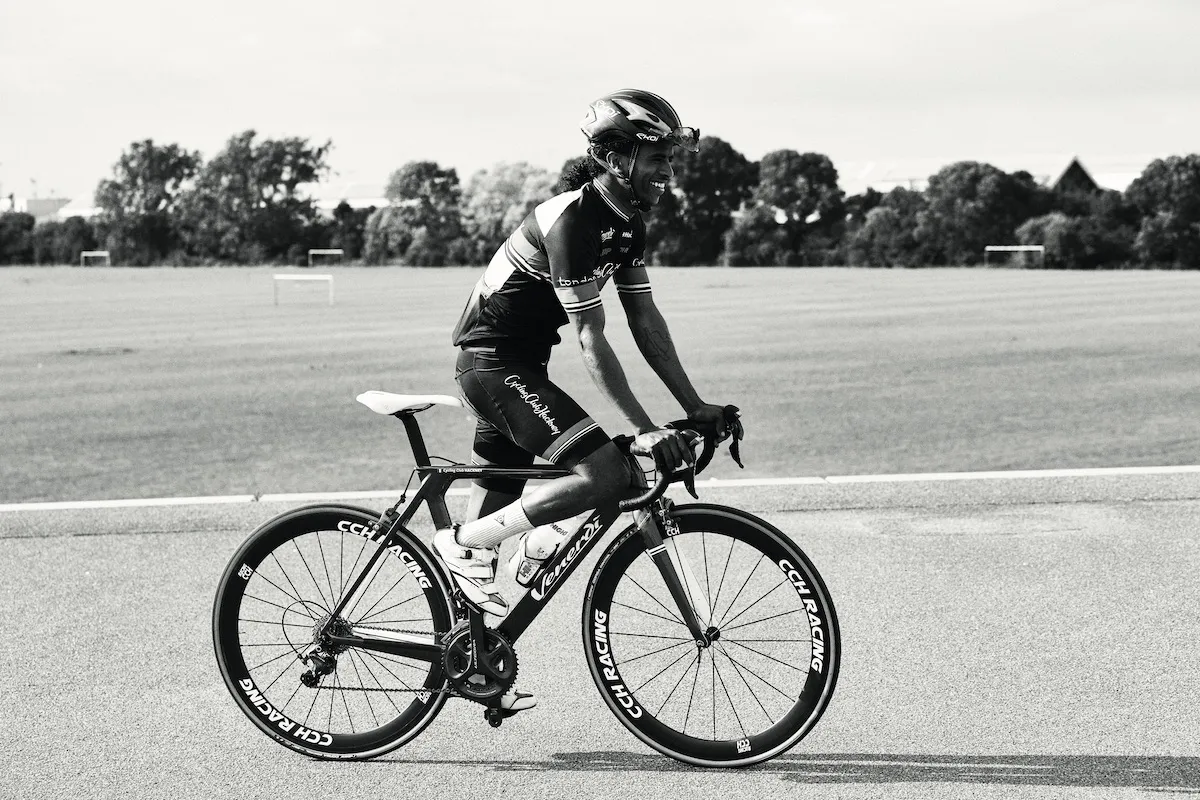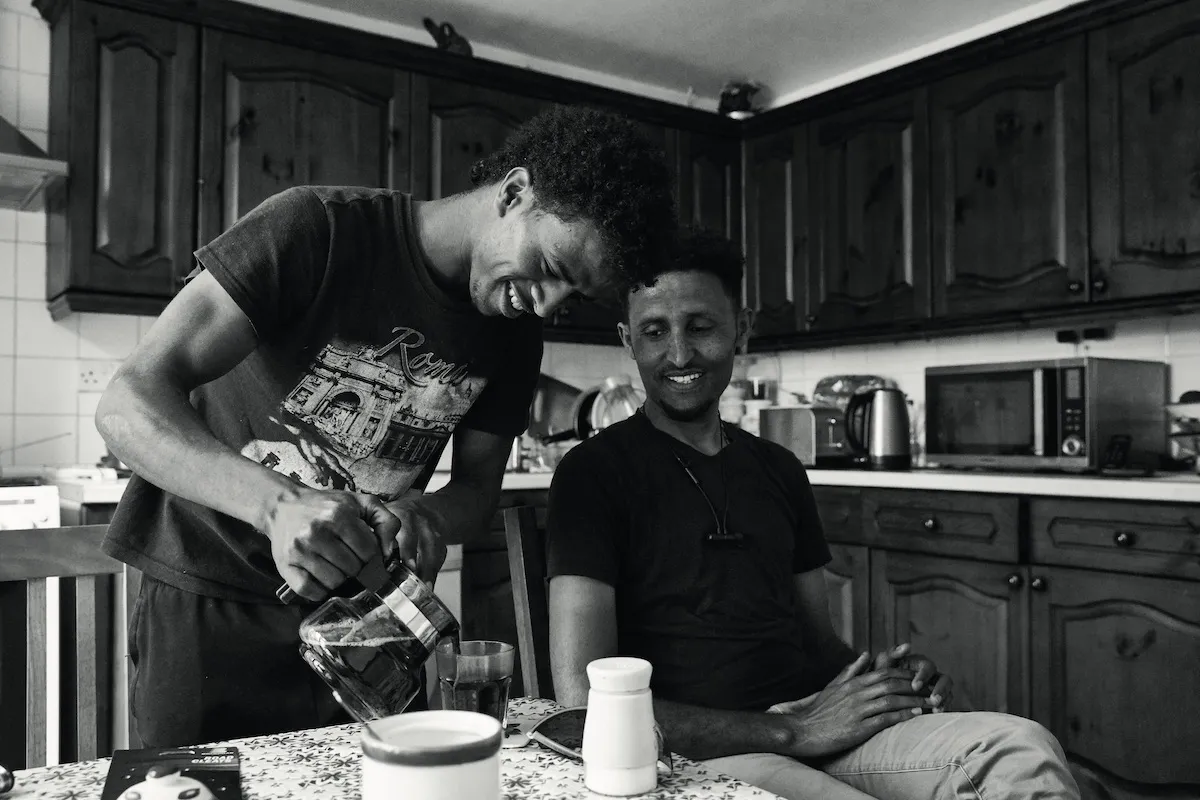Eritrea has been making headlines in cycling since Daniel Teklehaimanot wore the polka dot jersey of the climbers’ competition in the 2015 Tour de France. His exploits have helped to elevate the international profile of Eritrean cycling, making him a hero in the cycling-obsessed African nation.
Eritrea is a relic of Italy’s colonial occupation of East Africa. The Italians first settled in the area in 1882, and officially declared it a colony in 1890. Mussolini made Eritrea the industrial centre of Italian East Africa, and the capital Asmara’s population ballooned in the 1930s, becoming practically an Italian city. The first Tour of Eritrea – Primo Giro dell’Eritrea – was promoted by Eritrea’s Italian community in 1946, though the second edition in 1947 was suspended because of a growing guerrilla war in the British-occupied country. The race was revived in 2001 after a 50-year hiatus as a celebration of the 10th anniversary of Eritrean independence from Ethiopia.
Sadly, Eritrea has also been making headlines for all the wrong reasons. The long struggle for independence brought Isaias Afwerki to power in 1993, whose People’s Front for Democracy and Justice (PFDJ) party has since maintained a one-party state without elections. The Eritrean government has one of the worst human rights records in the world, including compulsory, indefinite military service, and many young people flee the country to avoid conscription, risking long and dangerous journeys across the desert to escape.
Heavy start
Haben Gebrehiwet of Cycling Club Hackney (CCH) used to race his bike in Eritrea as a junior. “Oh my days, yes, I had a racing bike,” the young Eritrean tells us, his good but broken English inflected with teenage British vernacular. “First I got a very heavy bike, it wasn’t good. I did one race and I talked to my father: ‘You have to buy me a nice bike!’ I was doing stuff with a mountain bike. My Eritrean one was very heavy, it was like 200kg or something,” he jokes. Gebrehiwet is a friendly, engaging and bright-eyed teen. He smiles as he recounts his early races over a coffee that he insists on paying for, as I’m his guest in Tottenham.
“There are a lot of people watching at the side of the road,” Gebrehiwet says of his junior races back in Eritrea. The UK cycling boom of the last few years is difficult to ignore, but Gebrehiwet paints a picture of support at a different level in his home country. “They give you something, you know. Something to eat, to drink, a mango or something like that. It’s very popular, not like in this country.”
His fledgling cycling career was interrupted in 2015, when Gebrehiwet had to flee his home aged just 14. His eyes darken and a furrow crosses his brow as he recalls the family that he left behind. “I’m not here with my family, just foster carers. They are from Eritrea. They look after me like their son.
“Everybody’s leaving Eritrea,” Gebrehiwet notes with a frown. “There’s no freedom in Eritrea.” The government imposes mandatory indefinite military service, though the recent thawing of relations with its neighbour Ethiopia has raised hopes that the length of military service will be capped. Amnesty International reported in its latest study that arbitrary detention without charge or trial continues in the country for thousands of prisoners of conscience, and restrictions remain on freedom of expression and religion. Human Rights Watch says around 12 per cent of the population has fled the country.
People between the ages of five and 50 are prohibited from travelling abroad, and if caught they would be detained until they paid hefty fines, while children close to conscription age caught trying to flee are sent to the Sawa military training camp. The official minimum age for conscription is 18, but children are sent to Sawa for military training with a requirement that they attend school there.
“My brother is in the army now,” Gebrehiwet says. “In the jungle for 14, 15 years. They [the government] are just thinking about the army... they’re not thinking about your future life.
“Nobody wants to be stuck in Eritrea,” he continues. “If you don’t return to the camp, they’ll come to your house and if you’re not there, they will take your brother or your mother, or your father. They don’t care.”
Gebrehiwet’s journey to the UK was far from easy. “First I went to Ethiopia, then I went to Sudan, overland by pick-up truck. After, from Sudan to Libya by the Sahara. Libya was disgusting. I was there for one month... just eating once a day. Some people, they die there. It was horrible. Oh my days...” Gebrehiwet trails off. “That was the bad bit.”
His remarkable journey, sadly familiar to thousands, was still far from over. “From Libya I came by boat to Italy, then on to France, and finally here. It was very hard, but we were lucky. We just went straight in a lorry, some people closed it, and we weren’t stopped. It’s very scary. A lot of people die.”

Cycling focused
Gebrehiwet arrived in London full of determination. “When I came here, in my mind it was: ‘Just start cycling.’ Nothing else.” The Eritrean has been granted refugee status, but for many refugees isolation and integration can be a huge barrier. Fortunately, a chance meeting in Regent’s Park, where early morning training laps are a staple for many of the capital’s cyclists, gave him an introduction to a local cycling club.
Zemichael Abrha was riding there one day and met Gebrehiwet by chance. “When I saw his talent and desire to race, I started approaching local clubs,” Abrha says. Also from Eritrea, Abrha used to race there before coming to the UK 11 years ago. He works as a finance officer in his day job, but he has become more involved in cycle coaching since introducing Gebrehiwet, and a fellow Eritrean Fnan Afewerki, to Cycling Club Hackney.
The East London club, headed by Keir Apperley, has a strong focus on diversity and outreach, particularly for disadvantaged local young riders. The club’s Aspiring Rider Development Project aims to help young riders from multi- cultural backgrounds perform to their highest potential, helping out with kit and waiving membership charges. This grand ambition is backed up by real results from the club’s junior development programme. CCH has sent local riders Tao Geoghegan Hart and Alex Peters through its ranks to the WorldTour in recent years.
Apperley is enthusiastic about the project. “It’s an uplifting thing,” he says. “You feel a responsibility. You think, actually, I need to really look after myself because I want to be in good shape, fit enough to work hard in 10 years’ time. I want to see results.”
Gebrehiwet fits in training sessions around his job as a waiter in South London – a 25km commute each way, that he does by bike, sometimes fitting in extra laps of Regent’s Park en route – and studying English and maths at college in North London. “Maths is a little bit difficult,” he says. “English is okay.” But work and study don’t always leave much time for training. “Yesterday I trained at 1 o’clock in the morning, on the rollers for two hours,” he says. “I went to sleep at 3am!”
His schedule doesn’t give him time for much else. Gebrehiwet says he sees friends occasionally, maybe once a week, but his focus on cycling means he’s reluctant to give up more of his time to socialising. “If I have rest time I contact them,” he says, but “it’s a waste of time to meet every day. Time is important; you can’t bring it back if it’s passed by. You have to use it for something.”
CCH has given Gebrehiwet more than just an opportunity to ride. Abrha says the club has helped Gebrehiwet and Afewerki to integrate, giving them friends, and boosting their confidence and English. The results are coming too. In 2017, Gebrehiwet raced to bronze in the eastern region junior road race championships, and achieved his Cat 2 licence, with Afewerki joining him in 2018. All this on aluminium bikes, in the carbon arms race that is modern amateur racing.
Expert advice
Gebrehiwet and Afewerki have benefitted from advice from CCH alumnus Alex Peters, who rode for Team Sky in 2015 and 2016. Peters gave Gebrehiwet a heart-rate monitor, nutrition advice and a programme to make the most of training sessions. “One minute hard, one minute tempo, 10 minutes, like sprints,” Gebrehiwet says. “It’s really hard, like in a race. You go for an attack, and then you have to continue.
“In 2017 in the summer, I didn’t have a job and I just trained, six days a week,” Gebrehiwet says, his determination evident. He’d go out early for a long ride, getting back in time to watch the Tour de France. “I go and train, come back, eat, sleep. That’s it.”
Gebrehiwet recognises the achievements of Teklehaimanot, and the boost he has given to African cycling – “there are strong guys in Eritrea, but they haven’t had the opportunity” – but his hero is Alberto Contador. “He’s so powerful. When he attacks, he’s flying,” Gebrehiwet’s face lights up, grinning, as he pours sugar into his soy latte.

Would he ever want to represent Eritrea?
“I don’t know. If I become a professional cyclist, it doesn’t matter. If I’m in Eritrea, I can race in Eritrea, but I’m here, so I race here. I want to ride with England as well, because they are helping me here.”
Abrha thinks both young men have the talent, and are in a good position to develop further. Gebrehiwet’s ambitions are to progress to Cat 1 in 2019, and get a better bike, which depends on funding and sponsorship for the club’s programme, to give him a chance at becoming professional.
CCH’s Apperley is modest about the opportunities he has given Gebrehiwet. “Well, I haven’t given it to him yet, to be fair, but we’re working together to try to make something happen.”
Gebrehiwet is not certain where his cycling will take him, but he’s clear it’s already brought him a long way. “If I’m not cycling, I don’t know. I would be crazy.”
Words by James Burgess; Images by Michael Blann
To buy or subscribe to Cycling Plus, head here
